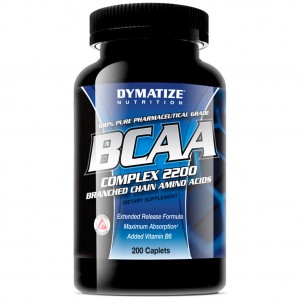By: Jose Antonio, PhD
Date Published: May 2011
The BCAA (branched-chain amino acids) leucine, valine, and isoleucine can help improve muscle recovery and even enhance performance in endurance events. Yes, that’s right. We have science to prove it. But first, let’s go back to school.
Trivia Question: Which of the following macronutrients are ‘essential’ in the human diet? (The word ‘essential’ as it refers to our diet means that we need to consume that food or nutrient because our bodies do not make that nutrient endogenously).
Your choices are:
A. Carbohydrate
B. Protein
C. Fat
D. All of the above
E. Two of the above
Did you figure out the answer?
The Answer is: ‘E’
That’s right. Only two of the three are essential. And they are protein (with amino acids as the building blocks) and fat (i.e. the essential fatty acids).
In the protein category, there are amino acids which are unique in their own right. They’re the branched-chain amino acids (valine, leucine, and isoleucine). And of the three BCAA, leucine is very important. Here’s why.
One study looked at the effects of dietary leucine supplementation on exercise performance of outrigger canoeists (i.e. paddlers). Thirteen (ten female, three male) competitive outrigger canoeists underwent testing before and after 6-week supplementation with either capsulated L-leucine (45 mg/kg.d) [that’s equal to 3.15 grams of leucine for a 154 lb individual] or placebo (corn flour). Testing included anthropometry, 10 second upper body power and work and a row to exhaustion at 70-75% maximal aerobic power where perceived exertion (RPE), heart rate (HR) and plasma BCAA and tryptophan concentrations were assessed. What happened?
Leucine supplementation resulted in significant increases in plasma leucine and total BCAA concentrations. Upper body power and work significantly increased in both groups after supplementation but power was significantly greater after leucine supplementation compared to the placebo. Rowing time significantly increased and average RPE significantly decreased with leucine supplementation while these variables were unchanged with the placebo. Leucine supplementation had no effect on the plasma tryptophan to BCAA ratio, HR or anthropometric variables. Six weeks’ dietary leucine supplementation significantly improved endurance performance and upper body power in outrigger canoeists.(1)
During exercise, muscle protein synthesis decreases together with a net increase in protein degradation and stimulation of BCAA oxidation (the BCAAs are of course leucine, valine and isoleucine). Thus, both insulin and leucine are key regulators in muscle protein synthesis!(2) In other words, they’re critically important.
Another interesting tidbit is that leucine by itself increases muscle protein synthesis.(3) By combing leucine with protein and carbohydrate, you get quite the anabolic effect. For example, in one study eight male subjects were randomly assigned to three trials in which they consumed drinks containing either carbohydrate (CHO), carbohydrate and protein (CHO+PRO), or carbohydrate, protein, and free leucine (CHO+PRO+Leu) following 45 min of resistance exercise. They discovered that plasma insulin response was higher in the CHO+PRO+Leu compared with the CHO and CHO+PRO trials. Whole body protein breakdown rates were lower, and whole body protein synthesis rates were higher, in the CHO+PRO and CHO+PRO+Leu trials compared with the CHO trial; moreover, the addition of leucine in the CHO+PRO+Leu trial resulted in a lower protein oxidation rate compared with the CHO+PRO trial. And to top it off, muscle protein synthesis, measured over a 6-h period of post-exercise recovery, was significantly greater in the CHO+PRO+Leu trial compared with the CHO trial with intermediate values observed in the CHO+PRO trial.(4) Another study discovered that 2 grams of the BCAA with some arginine actually lessened the amount of muscle breakdown during endurance exercise.(5) And more recently, BCAA supplementation lessened subject’s rating of perceived exertion.(6)
The moral of the story is, when you consume this terrific trio of amino acids, exercise will feel easier and you will gain or maintain lean body mass. So when reaching for a pre-workout cocktail, make sure it includes this Ménage à trois of amino acids.
About the Author:
Jose Antonio is an author, speaker, radio show host, sports nutrition scientist, and avid outrigger paddler. www.theissn.org
References
1. Crowe MJ, Weatherson JN, Bowden BF. Effects of dietary leucine supplementation on exercise performance. Eur J Appl Physiol 2005:1-9.
2. Norton LE, Layman DK. Leucine regulates translation initiation of protein synthesis in skeletal muscle after exercise. J Nutr 2006;136:533S-537S.
3. Lang CH. Elevated Plasma Free Fatty Acids Decrease Basal Protein Synthesis but Not the Anabolic Effect of Leucine in Skeletal Muscle. Am J Physiol Endocrinol Metab 2006.
4. Koopman R, Wagenmakers AJ, Manders RJ, et al. Combined ingestion of protein and free leucine with carbohydrate increases postexercise muscle protein synthesis in vivo in male subjects. Am J Physiol Endocrinol Metab 2005;288:E645-53.
5. Matsumoto K, Mizuno M, Mizuno T, et al. Branched-chain amino acids and arginine supplementation attenuates skeletal muscle proteolysis induced by moderate exercise in young individuals. Int J Sports Med 2007;28:531-8.
6. Greer BK et al. Branched-chain amino acid supplementation lowers perceived exertion but does not affect performance in untrained males. JSCR. 2011; 25:539-44.





Pingback: Go for BCAAs in your pre/post workout shake says Jose Antonio | trendilyfit